Become a Creator today!Start creating today - Share your story with the world!
Start for free
00:00:00
00:00:01

Agatha Christie (part 3)
In our final episode in our Agatha Christie series, we are joined by two guests who share their insights into her work.
We discuss:
The Mysterious Affair at Styles (1921)
The Death of Roger Ackroyd (1926)
The ABC Murders (1936)
Five Little Pigs (1942)
Curtain (1975)
“Dressmaker's Doll”
“In a Glass Darkly”
“Philomel Cottage”
Partners in Crime short stories
TV/Film adaptations
Sparkling Cyanide (1983)
Death on the Nile (2022)
And more…
For more information: cluedinmystery.com Instagram: @cluedinmystery Contact us: hello@cluedinmystery.com Music: Signs To Nowhere by Shane Ivers - //www.silvermansound.com
Transcript
Introduction & Guest Overview
00:00:11
Speaker
Welcome to Clued In Mystery. I'm Sarah. And I'm Brooke. And we both love mystery. Brooke, this is a very exciting episode. It's our first interview. And we've got two very knowledgeable guests today. I know. It's so exciting. This is something that you and I have dreamed of ever since we started talking about doing a podcast together was to have other people on who love mystery just as much as we do. And I think these two ladies definitely fit that bill.
00:00:40
Speaker
Absolutely. So we're going to talk about Agatha Christie with them. Let's do it. Today we have Sherry T. Mitchell, who is the author of the Marnie Riley mystery series with the third book in the series coming out in late 2022. Born, raised and educated in Northern New York state and an extensive traveler, she now lives in North Carolina.
00:01:00
Speaker
We also have Frances, who has read Mysteries since she was four. After some teaching, she opened the Mystery Bookshop Chronicles of Crime 22 years ago. She also writes crime fiction and the first books in two different series set in 1935 based in San Francisco are currently with an agent. So we're really excited to have you guys here to join in our conversation about Agatha Christie.
00:01:22
Speaker
Thank you for inviting us. Thank you very much.
Why is Agatha Christie a Timeless Author?
00:01:25
Speaker
Let's start by talking a little bit about what you think brings people to Agatha. So she continues to be that classic mystery author. And we see, you know, a couple of weeks ago, Death on the Nile was, the movie was released. And I know there's, you know, I'm sure there's a television of the adaptations that we'll see in the near future. So what do you think continues to bring people back to her? Do you want to start, Frances?
00:01:50
Speaker
I think it's her diversity and style of writing. So you can pick up a regular character that you learn to love and
00:02:00
Speaker
read through short stories or full-length novels that kind of thing so if you look at Poirot you get to really know him and his cast of characters and there are over 50 short stories with him and over 30 novels and then you can switch off to Miss Marple or you can read some of her supernatural stories, her standalone books, her play, the mousetrap and then there were none so there are certain books that really stand out with
00:02:30
Speaker
what she did. And it suits any age category. They're dated with some of the types of things that are discussed. But it's just that, I mean, at the store, I recommend her all the time to kids that are good readers, because they're engaging stories. I think she's timeless, really. That's really interesting. I imagine for a lot of people, she's the one of the first authors in crime fiction that people read.
00:02:55
Speaker
That's what I think, yeah. And her books are quite easy to read. They flow so well, very engaging. And I think that for someone who's trying to get into mysteries, I believe that her books are quite simple.
00:03:10
Speaker
I think they're quite easy to understand. Her mysteries, once you get into them, I solve them before they're done, but I've been reading mysteries forever. But for someone that's fairly new, they can understand and follow the mystery quite easily, if that makes sense. And the clues are all there. The clues are all there. You don't need some heavy duty scientific background about
00:03:37
Speaker
Cigarette ash to figure out what's going on. You're making fun of Sherlock. No No, but it's but that's the first thing that came to mind like you don't need any of that background it's all laid out But and I guess that's where I'm saying they're simple
Approaches to Reading and Recommending Christie
00:03:55
Speaker
I'm going to shock the three of you, I'm sure, and tell you that in mystery, since I read my first one, which now I can't remember what it was, but I was four, I always read the end first. I read the last three chapters first, and then I go through and see if everything has been put in there.
00:04:13
Speaker
Yeah, and see that tells me that when I give her my next book to read, I'm holding back the last two chapters. Meany, it does help in editing, like I edit mystery manuscripts and things, and it does help because you can tell right away if something's been left out.
00:04:33
Speaker
I always write the last chapter first. Okay. So Francis, so you said, you know, if someone comes to the, a young reader or someone new to mysteries, um, comes into the shop, then, then Agatha Christie is who you recommend. Do you then see them coming back and seeking out, seeking out more of her? Yeah.
00:04:51
Speaker
I have like from 10 year old kids up to 85, 90 year old people that are still filling in collections or just starting collections. And it depends if they like a classic read. First I find out what a person is usually reading. And then especially for kids, it gets them interested in reading. Mystery always does that. Okay. So if someone comes into your shop, then Francis looking for a recommendation for the first Christie book that they should read, what, what do you recommend?
00:05:21
Speaker
I always recommend the first one the mysterious of ferret styles and mainly I do that because it might not be your best work, but if you go through all of her books when you get to curtain because a lot of people like to read in order I don't care but.
00:05:36
Speaker
if they do, Curtain wraps up back at Stiles because when Poirot is convalescing, supposedly, it is at the Stiles' manor house that the first book started in because it's been taken over just as Christie's home
00:05:55
Speaker
her private home in the country was taken over by the American Air Force and so she wrote that in 45 even though it wasn't her 40s, even though it wasn't published until 75. So she's at the brilliance of her writing and she writes curtain and it stays in a vault for 30 years.
00:06:16
Speaker
Yeah, I love that from a storyteller's standpoint, because I want that to happen in the book I read. I want that full circle feeling at the end of the story. And she does that in her whole career. The fact that she brings it back
Christie’s Innovations and Adaptations
00:06:30
Speaker
to styles. Yeah. And it was planned, right? I believe I read that she wasn't going to have it published until after her death. Her daughter did encourage her to do it a little earlier than planned, so she was still living.
00:06:43
Speaker
It's just so genius. It just I love it so much as a storytelling mechanism So I start out with the first one and then I say it doesn't matter what you read after that But if you're going to keep reading her
00:06:55
Speaker
don't read curtain first, but read the first one first. And it introduces you to Poirot, of course, in a different kind of way. That book is also instrumental in changing the rules of writing mystery. So she ended that book originally in the manuscript in a courtroom scene. The publisher said, it doesn't work as well as if you did a wrap up with all the suspects there.
00:07:23
Speaker
So that sort of changed how writing was being done. So there she was with her having to totally rewrite the ending of the book, quite different than a courtroom scene. So that's important too for knowing about her breaking of boundaries of different things, that she went along with a publisher who actually came up with a better ending.
00:07:48
Speaker
That relates back to a lot of the shows that we watch where like Death in Paradise, where they end everything, gathering everyone together. So pretty much every murder mystery show ends with that. And it was her. Even Jessica Fletcher. Pardon? Even Jessica Fletcher. Even Jessica Fletcher, that's right.
00:08:12
Speaker
Yeah, that's kind of the classic close, isn't it? That you gather all of the interested parties in the same space, often where the crime occurred. The detective reveals who the culprit was. I don't think I realized that, that that was her, but I mean, she kind of set so many of the rules that we associate with crime fiction. Well, she was the first to write a paranormal mystery too. That I did not know. Which one was it?
00:08:42
Speaker
And the other one was she was the first to have the killer as the narrator. Oh, yes. So that's the murder of Roger Axel. But her whole book of the paranormal, because people were not writing paranormal mysteries or supernatural mysteries until she wrote the first one. And I can't remember which one it was.
00:09:10
Speaker
And then there's that, don't you have the supernatural short stories? Yeah, the seance. I've got the book and they are fantastic. Absolutely fantastic. Probably the one that I love the most is the call of wings. And I'm not going to say too much about it. And the dressmaker's doll and the red signal. All are fantastic. Dressmaker's doll.
00:09:38
Speaker
freaks me out because I hate dolls. They're creepy.
00:09:44
Speaker
But she probably created that association for a lot of readers then that association with dolls, right? Because that is that is a creepy story. It's good, though. It is good. And she wrote that detective fiction with Poirot. And you think about Miss Marple.
Character Analysis and Genre Exploration
00:10:00
Speaker
She's kind of do you think she's popular because readers can see themselves as her. Right. Like she's she's not a detective. She hadn't been part of the police, which was kind of Poirot's back history.
00:10:10
Speaker
I'll be honest, I don't like Marple. She irritates me, and I will not. I've read quite a few of them, but if I see it's a Marple, I move on. Her Kill Praro, I've read them all, but Marple...
00:10:27
Speaker
I grew up in a small town and she reminds me of a lot of gossipy old women. That's what's so interesting about her writing style is because she was able to peg that and put it down so that it does irritate you that much. Yeah. Yeah. But I won't read them. Yeah. But she based it on her grandmother. Is that one of her grandmother's? Is that correct? It is something like that.
00:10:56
Speaker
Yeah, I love everything she's done, but I will not read or watch a Marple because she irritates me. I'm not sure that that's what people want to hear. I think that it speaks to the different flavors that she was able to write, though.
00:11:14
Speaker
because we've talked before Sarah and I about, you know, she's got psychological thrillers and then the paranormal stuff, although I haven't read it, seems like it might lean a little bit more towards like horror mystery. And then you have the straight detective fiction and it's what a skill to be able to do the different types of stories. And I guess there's something for everybody in there.
00:11:41
Speaker
Well, she had the love stories with the Mary Westmacott name as well. She had the romance novels. I've not read any of those because it's not a genre that I enjoy, but she wrote under Mary Westmacott as well.
00:11:56
Speaker
And I think they now all say on the cover Agatha Christie is Mary Westmacott, don't they? Yeah, they've changed it that way. So the first Mary Westmacott, and I can't recall right now which one it was, was apparently the book she had always wanted to write. And a lot of her short stories have aspects of romance in them. One that I read yesterday to remind me in a glass dark darkly is like six pages long.
00:12:26
Speaker
she wrote it in 34 and it's about a fellow who has gone to a manor house to visit a friend and he looks in the mirror and a door is opening behind him and he's tying his tie and he sees a murder take place but when he turns around yeah it's he's looking he's looking in the mirror tying his tie yes when he turns around there's no door there there's a big wardrobe in front of the door
00:12:52
Speaker
And he falls in love with the guy's sister, who he realizes is the woman he's seen being murdered. And it carries on from there. It's six pages long. It is really good. It is really good. I know that one. I've read it. And see that has romance in it. Yeah, but it said Agatha Christie, so I read it. It was a short story. I didn't say Miss Marple. It wasn't Miss Marple.
00:13:24
Speaker
But no, I find that her short stories are so engaging and they tell so much in six pages, 12 pages, whatever it is. They're fantastic.
00:13:39
Speaker
Short stories are really hard to write and it takes a skill to be able to do that and to take your main character and know that the main character like Poirot, that short story that he's in is not long enough to drag it out into a full length novel. That's a skill too. Ian Rankin does the same thing with his rebus characters.
00:13:58
Speaker
Clearly, Agatha Christie had tremendous range in terms of what she could write and the genres that she wrote in. How do you see her legacy influencing mystery and crime writing today? I would say that because she, again, I go back to the diverse styles of her writing, she has really shown that you can go past boundaries that have been set within the genre.
00:14:27
Speaker
take any topic and deal with it as a crime fiction piece or a crime short story and her I keep thinking diversity because there's so many different things that she did so if you look at some of her books so the Pale Horse written in the 60s early 60s was showing the changing times that's all about witchcraft
00:14:52
Speaker
It it isn't a marble. It isn't a Poro It's a standalone book and you could read that today and it could be today. That's also something else and she also showed that you break away from that classic style of manor house mystery and Just have everyday regular people Philomel cottage my favorite short story of hers is
00:15:17
Speaker
is about a couple that go to live in a cottage supposedly been bought by the new husband who they've only known each other for a few weeks and something happens that makes the wife feel afraid it is timeless that book so I think her what she's teaching crime writers and what she can teach them is
00:15:44
Speaker
that you could set your book in any sort of time, in any kind of situation, just make it so that it seems like normal everyday people. Have any of you read the Partners in Crime short stories with Tommy and Tuppence? Yeah, those are, those are fun.
00:16:06
Speaker
Those are a lot of fun. They're a lot of fun. He was Secret Service. Something like that. And then they form their detective agency. The Blunt Detective Agency. They're really fun. They are. They're funny. They're a bit kitsch, I think is probably. Yeah. I don't know. They're just really good. If you haven't read them, highly recommend it.
00:16:29
Speaker
The last one she did of them, she made an error in which the publishing house didn't pick up on. And she has Tommy getting in a train and climbing out of his car. Ah, interesting. So now you have to go and look that up. So it's a later one. Even she made mistakes. I know. I felt quite good when I saw that.
Modern Adaptations and Audience Appeal
00:16:56
Speaker
I remember reading it thinking I thought he was in a train and then I looked it up to see and that is one of the errors that had been made.
00:17:04
Speaker
So Francis, you were talking about how timeless her mysteries are. And Brooke and I have previously talked about how any of the television or film adaptations of Christie's work seem to be pretty true to the time that they were written. You don't see the kind of leap in time that we see, for example, with Sherlock. There's present day versions of Sherlock. Do you guys have any thoughts about why those adaptations
00:17:34
Speaker
have remained true to that time. There's one called sparkling cyanide that was actually, I think it was like 70s and it sucked. Yeah. So I would say that that probably has a lot to do with it. I also think that people enjoy period pieces where mystery is concerned. Especially art deco stuff. Art deco stuff, yeah. Their sets are phenomenal.
00:18:02
Speaker
I think if you try to take hers out of the timeframe, it loses a lot in translation. Brooke, you saw the new film, right? I did. Is the death on the Nile? Yeah. And have they updated that? I mean, it seems like it's period piece, but I was reading different reviews that said that they've made changes and that they're trying to get younger audiences to watch it.
00:18:27
Speaker
period is true to the story. It remains in the correct era of the setting and it's gorgeous, I will say. I mean, they did a phenomenal job. They have kind of ritzied it up a little bit, I think from the, is it the 1970s when the last film was made? So this is very swanky.
00:18:49
Speaker
And it's a little sexy. The bride and groom have kind of a dance scene that is, you know, kind of a little risque, but not too risque. Uh, but I, the only additions that they made were more to some background information for Poro.
00:19:06
Speaker
they're kind of creating a backstory for him that is not Agatha's. I think what I had heard was that maybe they're going to try to have a series of these that Bran is going to make additional ones and so they're kind of trying to bring this storyline through. I have strong feelings about that personally but I mean overall I think the movie was great.
00:19:28
Speaker
Yeah, I don't want to say too much because I don't want to spoil it for you guys, but I would be really interested in talking with all of us together later once we've seen it and to kind of talk about how we feel about changing a character's backstory. The Orient Express was quite true to the story. It was. And to Poirot. Mm hmm. Brown is, yeah. I don't understand why someone would want to change someone else's character's backstory, that. Yeah, especially her kills, because I mean,
00:19:57
Speaker
He's such a wonderful character. We don't really know a lot about his backstory. Right. And I would say that that's more of what it's doing is that they're giving him information that we wouldn't have known before. They're not necessarily changing, but they're adding to. And you'll remember in the Orient Express, he had the locket of the supposed, his lost love, a locket of a photograph of a woman. And that kind of expands in this film.
00:20:25
Speaker
I think the thing is always when you watch the movies, whether it's used to Knopf or Finney or David Suchet, Hercule Poirot is quite asexual. With Brana, he is, I mean, he's just a naturally sexy guy. You know, if he's now the face of Poirot, perhaps it's what they're trying to achieve. I don't know. And he has that full head of hair. Yes. And the giant mustache.
00:20:54
Speaker
And if they are trying to get a younger audience, it may be what they're trying to do because as a marketer, as my other career, you don't want your audience to be dying, as we say.
Christie’s Influence on Modern Mystery Writing
00:21:08
Speaker
And if it's people my age or older reading Agatha and watching the movies, you want to make sure you've got that younger group coming up. Which is interesting because, you know, Francis said earlier that
00:21:20
Speaker
I get that has that appeal for younger authors, right? Or sorry, younger, younger readers. So I wonder how much you really need to adjust her stories to appeal to that, to that younger audience. I don't know. I mean, maybe with movies, I mean, it is a such a different medium and let's face it, you know, Hollywood has ruined a lot of books for Pelican brief. The movie was better than the book.
00:21:45
Speaker
Yes, when we left the theater, I said, well, the book was better. And my husband said, that's what you always say. And it's not, it's not her longest work. It's a short, it's actually one of her shortest novels that she wrote my favorite of
00:22:01
Speaker
Any of the Christie's are the ABC murders because there's quite a twist in that because they have Poirot on the run, the murderer trying to taunt him. And the murderer is always one step ahead. I haven't read anything else that's like that. So that's one of my favorites because it is so different. John Malkovich. Yeah. Even even the TV version was quite good. I enjoyed it. I enjoyed the books better, but I did enjoy that.
00:22:32
Speaker
So we've talked a little bit about the different kind of genres that she wrote in, but I think for me at least, I've always associated Agatha Christie with cozy mysteries. Brooke and I have talked about this, that some of what we consider to be the rules around cozy mysteries today, she was breaking those, having children as victims or as the murderers, right? Would you agree that she was writing cozies?
00:23:00
Speaker
I know that people say that and I don't, Poirot is not a cozy mystery, any of his, right? Miss Marple is closer because she's that female sleuthy kind of character who has no background in sleuth except she has an interest in people. So they would be closer to a cozy, but not the majority of her work, certainly not the supernatural stuff. And some of her murders are, they're not easy murders, right?
00:23:30
Speaker
They're quite dark. Yeah, I don't think of her as a cozy mystery writer at all, especially, especially Poirot.
00:23:38
Speaker
Yeah, I think a lot of the classic writers like Allingham or Nio Marsh fall into Christie's category as well. They're not, they're not cozies. They're not like the cat and dog mysteries and any kind of female sleuth, like the cooking mysteries and that kind of stuff, right? Those are cozies in my opinion. What do you think Brooke? Yeah, I think you're right. I do think that she heavily influenced what we see now though in the cozies.
00:24:05
Speaker
I feel like authors from this day and age are taking that Miss Marple and running with it and that's where we see, you know, the bookshop mysteries or the bakery mysteries and things like that. I definitely think they're heavily influenced by her work. Do you agree with that? Yes, more so for the Marples.
00:24:25
Speaker
that it's the Marple character that has influenced all of that. And it's a small town rather than a big city. That's another big difference. One of the other things about Christie is that the murder would have occurred in the past. She did a few books like that and
00:24:42
Speaker
and Poirot is hired to or investigates for a variety of reasons these past murders. So Five Little Pigs is a brilliant example of that because the daughter of a woman who has been arrested years before and dies in jail has been arrested for killing her husband.
00:25:01
Speaker
And it's it's five different members of the household tell their perspective of how they see what occurred leading up to the murder of this horrible husband. And he has to solve that going back over their stories and hearing it. It's kind of like Ian Pears is the instance of the fingerpost. That's another example of that kind of mystery where people see things differently, but they've all seen the same thing and they've all been together at the same time.
00:25:31
Speaker
But because of their backgrounds, they relay this information differently to the investigator. So that is in the five little pigs. So that was quite different. You know, she was always willing to try something new. Yeah. So so that's kind of like a cold case investigation. Yes, exactly.
00:25:53
Speaker
Well, and we've already talked about the death of Roger Ackroyd and how that was sort of groundbreaking in terms of having the killer as the narrator. I think Brooke and I talk about that. And Poirot being on the sidelines of that because he was investigating, but he wasn't telling the story. It wasn't his perspective of things.
00:26:13
Speaker
And even just being willing to change points of view. We've spoken on that a little bit too, but that's a risky thing
Christie’s Legacy and Storytelling Mastery
00:26:22
Speaker
to do. And it's interesting that within the Poirot books, sometimes Hastings is the narrator. We've got Roger Ackroyd as a narrator. Sometimes it's sort of a first person. Sometimes it's a third person. And she makes it all work. And it's pretty fascinating that she would take, that's a risk in and of itself.
00:26:42
Speaker
quite amazing for a woman who had no formal education. Yeah, exactly. Yes. And who was told she couldn't start reading until what the age of eight and taught herself. Isn't that great? Amazing. I think too that changing of the voice and that sort of thing keeps things fresh, kept it fresh for her, because she got bored with Poirot.
00:27:04
Speaker
which is why she switched to Marple and then came back with fresh ideas, taking that break from the character and never lost any of their voices in any way.
Conclusion & Future Topics
00:27:15
Speaker
She has a huge volume of work, over 60 books, I'd say 100 short stories easily between all the characters and then all the other short stories. Yeah, very impressive. She must have had just an incredible imagination.
00:27:32
Speaker
and typing on those typewriters. That is a stiff job. That hurts. I have one of those. Holy moly. You have to bang. Well, I've asked all of the questions that I had. Brooke, do you have any other questions that you want to ask?
00:27:55
Speaker
No, I think we covered a lot. And I just want to say that this has been fascinating. This has been so much better than I could even imagine. So thank you guys for coming on. And maybe we can all do this again sometime on another topic. Sounds like fun. That would be cool. Thank you. Thank you for having us. So Brooke, that was our first interview episode. What did you think?
00:28:21
Speaker
Oh my gosh, it was so much fun. It was more fun than I even expected. And like I said before, this is something we've been looking forward to. And those two ladies are just so knowledgeable about mystery. I suspect we'll have them back sometime.
00:28:37
Speaker
I would love to have them back again because as you say, they know a lot about, certainly a lot about Agatha Christie, but they also know a lot about mystery in general. Definitely. So that concludes our series on Agatha Christie, but I think there's so much more that we could talk about with her.
00:28:57
Speaker
Absolutely. One important topic that we definitely will be covering sometime in the future is the disappearance of Agatha Christie. I can't wait to talk to you about that one, Sarah. Yes, I am really looking forward to that as well. Before we get to that, though, we will have a couple of episodes about Sir Arthur Conan Doyle. I'm looking forward to that. And so for today, thank you for joining us. I'm Brooke. And I'm Sarah. And we both love mystery.
00:29:28
Speaker
Clued in Mystery is produced by Brooke Peterson and Sarah M. Stephen. Music is by Shane Ivers at Silvermansound.com. Visit us online at cluedinmystery.com or social media at Clued in Mystery. If you liked what you heard, please consider subscribing, leaving a review, or telling your friends.
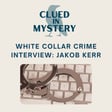
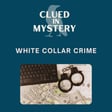
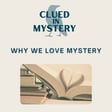
![[re-release] Dorothy L. Sayers image](https://media.zencastr.com/cdn-cgi/image/width=112,quality=85/image-files/61e1c276e3ec42007857cff9/0c9f0c0f-65b5-423a-a129-9414d2b8819e.jpg)
![[Re-release] Christie's Characters: Harley Quin image](https://media.zencastr.com/cdn-cgi/image/width=112,quality=85/image-files/61e1c276e3ec42007857cff9/19b66ded-f629-44f5-8280-f8a4afd4697c.jpg)
![[Re-release] Magic and Mystery with Tom Mead image](https://media.zencastr.com/cdn-cgi/image/width=112,quality=85/image-files/61e1c276e3ec42007857cff9/bf587b93-b2a8-41f6-af97-4772e2c0caa2.jpg)
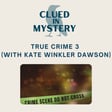
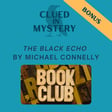
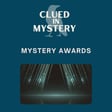
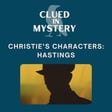
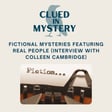
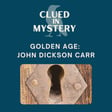

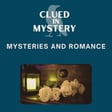
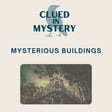
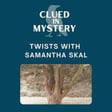
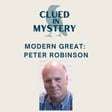
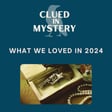
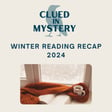
![[Re-release] Celebrity Authors image](https://media.zencastr.com/cdn-cgi/image/width=112,quality=85/image-files/61e1c276e3ec42007857cff9/6bf85c27-5b4b-472c-9f00-1aceb11c14f7.jpg)